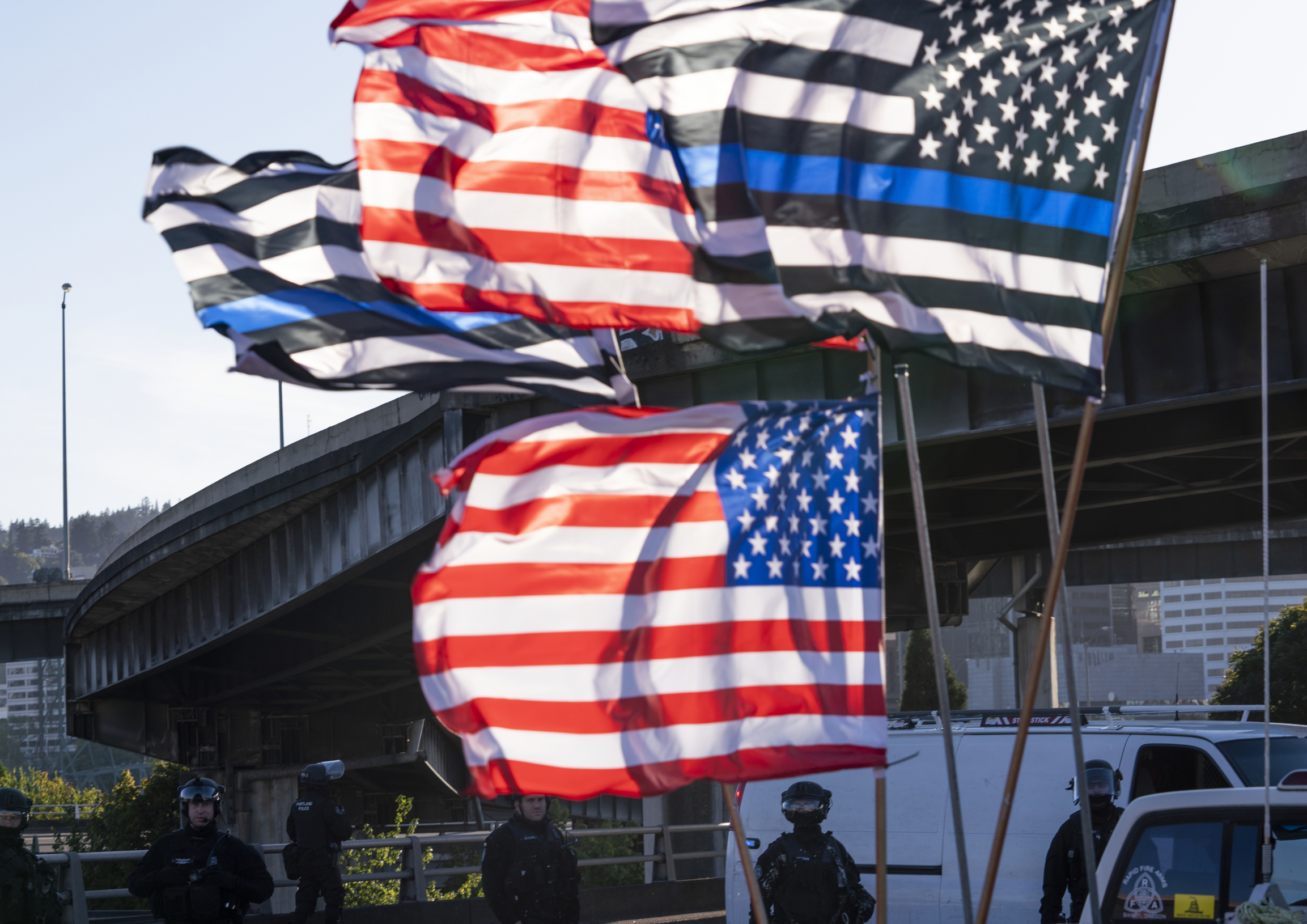
A miles-long caravan with far-right activists arrived in Portland on Aug. 29. Counterprotesters turned out in droves to stop the caravan by day, and many clashed with Trump supporters that night. Then events took a deadly turn.
Jonathan Levinson / OPB
Shortly after sunset on the day he would die, Aaron “Jay” Danielson and his Patriot Prayer comrade Chandler Pappas walked through downtown Portland toward the epicenter of the Black Lives Matter demonstrations that had gripped the city for 93 consecutive days.
The far-right activists had ridden into town that afternoon in the back of a pickup, armed for battle and part of a miles-long caravan in support of President Donald Trump. They’d been jeered at and hit with bear spray, and some in their crowd had returned the favor, firing mace and shooting paintballs at racial justice protesters. And now, after a warm late-summer day of laughter and hard drinking, they headed once again downtown, where hundreds had gathered outside the boarded-up police headquarters and the U.S. courthouse, blanketed in graffiti.
By 8:44 p.m. the two men, both quite drunk, had closed to within four blocks of the demonstrations. Neither took notice of Michael Reinoehl, the tall, gangly man in front of them, who had spied the duo over his shoulder and now ducked into the entrance of a parking garage. Reinoehl, his movements captured by a nearby security camera, hid behind a concrete wall, right hand hovering over a holstered .380-caliber pistol.
He watched as the two men passed, Danielson dressed in khaki cargo shorts and a Patriot Prayer ball cap.
At that moment, Danielson gripped a collapsible baton in his left hand, a can of bear spray in his right. He also had a fully loaded Glock 17 in a holster and his pockets held another three magazines — 71 rounds in all. A toxicology test would later reveal that Danielson’s blood-alcohol level was more than twice the legal limit to drive in Oregon. But on video, the strapping man with the ginger beard does not appear to wobble.
Reinoehl stalked into the street with the .380 in his right hand while waving his left hand in the air. Another man striding next to him in a black sweatshirt with the anti-police slogan “Fuck 12” also waved. They appeared to be summoning others.
“Hey,” one shouted, “we got him right here! We got a couple right here.”
Danielson turned toward the shouts and lifted the can of bear mace.
“He pulled it out!” someone shouted.
Reinoehl leveled his pistol from about 40 feet away. Danielson took one full running stride, right arm extended, and fired a cloud of bear mace in front of him. A split-second later, a bullet struck the canister in Danielson’s hand. Then, on his next stride, another slug traveling at 1,000 feet per second drilled through his chest, lungs and aorta. He staggered a few steps before crumpling to the pavement. He died in minutes.
The United States is entering an election week thick with the potential for violence, with federal officials worried that Portland and Seattle could be flashpoints because of the presence of well-armed extremists on both sides and the history of street clashes in both cities — including the Aug. 29 confrontation between Danielson and Reinoehl. OPB and ProPublica have taken a close look at how the two men arrived at the crucial moments before shots were fired. That encounter, a drunk man who inexplicably charged at someone brandishing a loaded pistol, offers a glimpse at how easily America’s deep political divide can turn deadly.
These two middle-aged white men shared a common backstory: both grew up in rural stretches of the Pacific Northwest; both loved snowboarding; both became political radicals, though on opposite ends of the fight over what the United States represents. The protests that shook Portland all summer focused both men’s anger and fear. Both waded into the protests and counterprotests night after night — Danielson videotaping the mayhem, Reinoehl serving as volunteer security for Black Lives Matter protesters. Both came armed for the battle they saw building toward civil war.
Amid the tumult, both found something they’d lacked for much of their lives: A sense of greater purpose and a feeling that they belong to something larger.
And both ended up dead.
A kid named Sun Hawk
Aaron Joseph “Jay” Danielson, a Portland businessman, died in the street six days shy of his 40th birthday.
He grew up in a patchwork of golden fields and green forests outside Spokane, Washington, a country boy steeped in patriotism and free with his bone-crushing hugs. His father and stepmother, retired educators Dave and Mary Danielson, described him as an avid outdoorsman — he could build a campfire in the wettest conditions — and a natural athlete who favored the adrenaline rushes of snowboarding, zip lines and anything on wheels. He was smart and kind, they said, and a conciliator. But he was also stubborn, his dad said, and an unrepentant speeder who collected a pile of traffic tickets.
Spokane sits on the conservative eastern side of deeply blue Washington, hundreds of miles from the liberal stronghold of Seattle. The region, including the Idaho panhandle, has a long history as a hotbed of right-wing extremist groups, militias and neo-Nazis.
Dave Danielson, a conservative who likens Tucker Carlson to a modern-day Walter Cronkite, said his son helped him build their home. Jay’s mother, whose heritage is half Yaqui and Maya, tells of a dream she had not long after his birth in which she saw a red-tailed hawk perched on a fence post, sunshine beating against its chest. The next day, after she woke from her dream, a red-tailed hawk thumped on their roof and was found dead in the yard. She gave her boy the Indian name “Sun Hawk.” She has declined to be named in this story, because she fears reprisal.
Jay Danielson dropped out of high school during his senior year in 1999 and moved to Portland in 2001, following a girlfriend to the city. There he met Luke Carillo, who also moved to town that year, and they quickly became friends. In 2014, they incorporated a business, NW Specialty Moving, and worked long hours on the road. They carried out more than 400 jobs a year, moving pianos, hot tubs, gun safes, arcade games, stone statues and other back-breaking items. Carillo, a big man himself, described the 6-foot, 206-pound Danielson’s physical strength like this: “He’s a true freak.”
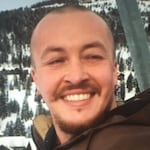
Aaron Joseph “Jay” Danielson
Portland Police Bureau / Portland Police Bureau
Danielson worked hard and played hard. While Carillo married and raised two boys who called their dad’s business partner “Uncle Jay,” Danielson dated a lot of women and logged enough hours on Portland barstools that bartenders knew his favorite drink — something different at each bar he patronized.
Carillo and others described Danielson as a nature and animal lover who snowboarded on the slopes of Mount Hood, a conical glacier peak 50 miles east of Portland. Danielson worried about his health, with strong, sometimes scientifically questionable opinions about what went into his body: He favored organic foods, would not drink fluoridated water and feared cancer from cellphone towers and Roundup weed killer.
One of Danielson’s former live-in girlfriends, Christine Banks, described him as a survivalist who had prepared “bug out” bags for both of them in the event of a natural or human-caused cataclysm.
Another girlfriend described him as relentlessly cheerful.
“He was always a happy guy, wanting to keep peace, no drama,” said the woman, who lived in a Portland suburb with Danielson for more than two years in the mid-2000s. The former girlfriend declined to be named in this story because she fears getting drawn into a political fight. She said she couldn’t remember Danielson ever talking about politics or religion.
Danielson spoiled his two dogs — a Chihuahua named Pancake and a miniature pinscher named Journey — and even took them with him on moving jobs, the former girlfriend said. When Danielson died, she adopted his dogs.
‘I never really fit in’
Michael Forest Reinoehl was born in the spring of 1972 and grew up in Sandy, Oregon, a rural community outside Portland, surrounded by farms in the shadow of Mount Hood. He was the oldest of three children and from a young age seems to have struggled with his family relationships. In an interview conducted after the shooting, Reinoehl said that his dad was a musician, involved in salsa and blues bands, and that his mother was from Austria. His mother kicked his father out of the house in 1989, but the couple never actually divorced.
“I never really fit in,” Reinoehl said in the interview, which was first broadcast by VICE; OPB and ProPublica licensed a copy from a second videographer not affiliated with VICE who was also recording.
Reinoehl’s sister, who received death threats after he shot Danielson, agreed to speak on the condition she not be named.
“My oldest brother was this nebulous figure who popped in and out of our life to take whatever hard-earned money Mom had,” she said.
The animosity between Reinoehl and his much younger siblings, she said, seems to have always been there. “He’s always been jealous of us because — I don’t know — he was a single child long enough to be bitter about it,” she said. “We’ve always had issues with him because he was off snowboarding, traveling the world, living the high life.”

Michael Reinoehl during an interview with a videographer on July 31, after he said he was shot in his right arm during a scuffle in Portland.
Screenshot attained by OPB/ProPublica / OPB
Reinoehl performed snowboarding stunts in commercials, his sister said. But the full scope of his career remains unclear. Reinoehl’s son, Deaven Reinoehl, said his dad was in the 1990 film “Red Snow,” a low-budget flick about a snowboarding instructor wanted for murder who must find the actual killer. “Bad movie, low quality, and only available online,” reads one 2014 review on Amazon. “May have been my fault for not reading things through carefully, but I was dissatisfied with the purchase.”
The movie review was written by Reinoehl’s sister.
After the film, Reinoehl enlisted in the U.S. Army. He was assigned to the 9th Cavalry at Fort Lewis outside Tacoma, Washington. Reinoehl’s time as an active-duty soldier appears to have begun in his late teens and stretched about 14 months, ending in 1993. His former platoon sergeant recalled that Reinoehl’s stint in the military was marked by drug- and alcohol-related offenses on and off the base.
“I ended up getting busted for smoking marijuana,” Reinoehl recalled in the VICE interview. But he didn’t much like the military anyway or the people he served with: “Half of them were there for college money and the other half of them, it felt like they were just there to legally kill people.”
His first child, Deaven, was born in 2002, followed by his daughter in 2009. He spent years in a custody battle with their mother, and both accused the other in court documents of being bad parents. The state investigated Reinoehl’s allegations of child abuse and neglect by the mother and determined they were unfounded. Reinoehl and the mother of his children never married, and his ex stated in 2016 court papers that Reinoehl remained homeless and out of a job for quite some time.
Three years ago, Reinoehl’s sister severed their relationship via text message after she said her brother stole something valuable from her mother and refused to return it. Reinoehl’s sister refused to say what the item was but said it was important to her mother.
“It was a long list of things that built up over time,” his sister said. “I’d been ready to write him off years before that, but I hadn’t done so on behalf of my mother. It would have broken her heart for her children to be that estranged from one another. But when he finally crossed the line enough to make her say she was done with him, I asked her three times: ‘Are you sure about this? Are you sure you want to break contact? You are absolutely sure?’ She said yes, all three times. That’s when I sent that text and it was on the behalf of the whole family.”
‘I’m already in it’
Jay Danielson’s politics shifted even further to the right in recent years as the city of Portland collected from his moving company what he and his business partner considered exorbitant business taxes. In the last year, he became a regular at events attended by Patriot Prayer, a far-right Christian group that has frequently engaged in violence with the far left and sometimes attracted suspected white supremacists to their events. This summer, he frequently shot video of Portland’s nightly Black Lives Matter protests to document arson and vandalism, sometimes aboard his mountain board, essentially an electric skateboard.
Danielson strongly supported police and the right to bear arms, was staunchly anti-abortion and stood against what he described as illegal immigrants crossing U.S. borders to receive taxpayer-funded abortions, according to his friends and family. He resisted government intrusions on perceived civil liberties, including the mandatory wearing of masks to slow the spread of COVID-19. He worried that vaccines might be causing autism, even though studies have disproved that. Danielson also feared that China might eventually co-opt the U.S. government. And he detested the leaderless bands of black-clad antifa that had turned his adopted city, he believed, into a national disgrace.
He was an equal opportunity critic of mainstream news media, mistrustful of both CNN and Fox News. His parents say he seemed to be binge watching alternative news figures, including YouTubers Anthony Brian Logan (who bills himself as a “Black conservative”); Tim Pool (a celebrated videographer who supported Bernie Sanders for president in 2016 and recently announced his intention to vote for Donald Trump in 2020); and Portland Andy (who videotapes the city’s ongoing protests).
Danielson texted his father and stepmother often in the final months of his life, sharing his worries about the doings in Portland and the rest of the country. On July 25, he sent photos of the fire set by protesters beneath an iconic elk statue that had stood for 120 years. The statue occupied a spot in the middle of Southwest Main Street, which bisects the main protest area downtown. City officials soon moved the statue. To Danielson, the elk arson defied logic.
Danielson’s texts grew more urgent on Aug. 6, when he forecast to his father what he thought might happen after the Nov. 3 election: “If Trump wins, antifa will burn the country down. If Biden wins, the patriots are just not going to have it. Both scenarios mean we are fucked.”
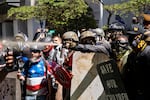
Far-right demonstrators clash with counterprotesters in downtown Portland, Ore., on Aug. 22.
Jonathan Levinson / OPB
Danielson’s parents grew more worried about their son on Aug. 23, when he sent them a YouTube video of Tusitala “Tiny” Toese, a prominent supporter of the Proud Boys, a self-described group of “western chauvinists” that some experts note engage in frequent violence and that have grown more militant. (They’re the group Trump would later urge to “stand back and stand by” when he was asked to denounce groups that have supported white supremacy at his first debate with Joe Biden.)
In the video, Toese was addressing the camera in front of the Multnomah County Justice Center in Portland the day before in the thick of the protests, a drum beating in the background. “We’re out here because we’re pissed off and we’re not gonna see this country burn, and we’re gonna take a stand.”
Toese had been convicted of a 2018 assault in which he attacked a man who objected to a series of pro-Trump statements and homophobic slurs that he and other Proud Boys shouted while stopped in traffic in Northeast Portland.
On Aug. 25, Dave Danielson texted his son about the Toese video.
“I agree with Tiny,” he wrote. “A very honorable position to take. I love you. Be safe.”
“Love you both,” Jay responded. “I’m safe.”
Two days later, Dave Danielson responded to another link his son shared.
“Civil war is scary,” he wrote.
“I’m already in it down here,” Jay responded on Aug. 28. “The left is now bringing guns. I’m gonna buy [a] bullet proof vest and helmet.”
Thirty-six hours later, he was dead.
‘It will be a war’
Reinoehl’s Instagram teemed for years with typical Portland dad photos: images of his kids; his husky; snowboarding on Mount Hood; a photo from the top of Portland’s Mount Tabor Park; and scenes of sunsets, trees and hikes. But the substance and tone of his posts shifted dramatically soon after the May 25 police killing of George Floyd.
After that, Reinoehl’s posts focused almost entirely on Portland’s racial justice protests.
“He’s the kind of person who should have stayed as far away from the protests as possible,” Reinoehl’s sister said, “because he’s not the kind of person who could rationally work through that intense environment.”
Reinoehl, a registered Democrat, said he started attending the nightly protests to provide security and even took his 11-year-old daughter. Like Danielson, he didn’t trust the media and wanted her to see what was happening for herself.
“I want her to have the working knowledge of what actually happened,” he said. “She’s out there and she’s seen it, she’s experienced it. So when she’s a grown woman and potentially a part of running this new country, she’s going to have real-life experiences to base her decisions off of, not propaganda.”
On June 8, an Oregon State Police trooper in the eastern end of the state — more than 300 miles from Portland — cited Reinoehl and his then-17-year-old son, Deaven, for racing in the middle of the night on Interstate 84. He clocked them at 111 mph. The trooper noted that Reinoehl’s daughter, dog, and his cat, Precious, all rode in his 2005 Cadillac STS, where the trooper also found a loaded Glock, cannabis and prescription pills. Reinoehl was charged with unlawful possession of a firearm, recklessly endangering another person and driving under the influence of intoxicants.
Eight days later, back at the protests in Portland, Reinoehl posted on social media that every revolution needs those willing to fight.
“I am 100% ANTIFA all the way!” he wrote on Instagram. “We do not want violence but we will not run from it either.” He declared that the protesters and antifa were his brothers in arms and that his children needed to live in a world run by human decency and common sense. “It will be a fight like no other! It will be a war, and like all wars there will be casualties.”
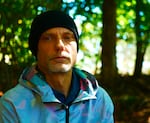
Michael Reinoehl.
Screenshot obtained by OPB/ProPublica
Sometime that summer, according to Deaven Reinoehl, his dad got a new tattoo on his neck: a clenched fist, a symbol of the Black Lives Matter movement. Deaven recalled the impulsive move: “I went on the Pinterest — 'cause that’s where you find good tattoos — and so I went in and searched Black Lives Matter logo. And then we found that fist. And then he was like, ‘Ooh, I want that on my neck.’”
Reinoehl’s own explanation for the tattoo was a little different. During his videotaped interview, he explained that he got it so that protesters would know whose side he was on while he was performing his security role. He described his protest duties as “trailing people through the crowds” if they were perceived as potentially dangerous and to “make it known that they’d been discovered.”
“While I was doing that, I kept getting confronted by people of the movement, people of color, because, you know, I also don’t look the part,” he told his interviewer. “So I got the tattoo so that everyone in the movement would know who I was, so that they wouldn’t interfere. … Had I thought that it was gonna get to this point, I would never have gotten (this) tattoo because, you know, I’m a marked man that has a giant tattoo that everybody in the world knows.”
Shortly after 2 a.m. on July 5, as police pushed back a group of downtown protesters, they confronted Reinoehl, who stood in the street refusing to budge. When officers moved in to arrest him, he struggled and, according to one officer, Reinoehl reached for his waistband. Reinoehl’s 9 mm Walther semi-automatic tumbled to the ground.
“Gun!” shouted an officer.
Police charged Reinoehl with resisting arrest, interfering with a police officer and unlawfully possessing a loaded firearm in public. But they could only charge and release him, owing to COVID-19 restrictions that had closed the county courthouse to misdemeanor arraignments.
Reinoehl claimed in the videotaped interview that he was shot in the arm one day that summer while downtown with his daughter. They were having hamburgers in the middle of the day, he said, when they noticed a commotion.
“There were a group of colored children that were antagonizing a white male who looked to be in his 40s,” Reinoehl said. The man wasn’t alone. People started pushing, there was a gun and Reinoehl said he jumped into action, placing himself in position to seize the weapon with his hand. He recalled making eye contact with the gunman.
“I could tell that he recognized me,” Reinoehl said. “Once he made eye contact with me, he pointed the gun at my stomach. I made a quick move, and he shot straight through my arm.”
Reinoehl said he didn’t wait for the police and instead climbed into a friend’s car with his daughter and dog, Ezo. They drove to a Portland hospital, where Reinoehl said he received treatment for the wound. Reinoehl feared he was followed there and later claimed one of his assailants showed up at the hospital. He recounted that story to a videographer on July 31, while dressed in a white hospital gown, a bandage wrapped around his right arm.
One week later, apparently unable to replace the 9 mm seized by police, Reinoehl texted his son: “Sell me the gun for a quarter pound of weed and $100 i’m getting tired of this shit and I need a piece now.”
A caravan to conflict
August was a violent month in Portland, punctuated by multiple weekend rallies and fights between people on the right and left.
On the day Reinoehl and Danielson’s stories collided, Danielson had been part of the pro-Trump caravan that began in the suburbs outside Portland but wound its way into the heart of the city, deviating from its announced route. He got maced just as the convoy set off. In a video posted to social media after his death, friends laughed at Danielson as one, Chandler Pappas, squeezed a mixture of Mylanta and water into his eyes to ease the burning.
Patriot Prayer founder Joey Gibson, seated in the back of a truck, cackled at the spectacle.
“We’re not even in downtown Portland, and you’re already getting maced,” he said, drawing hoots of laughter from the crew.
Danielson grinned through the eye-squinting pain.
“I don’t know what happened,” he said, drawing more laughter.
Reinoehl was downtown with his son when he saw the pro-Trump caravan snaking through the city. “I had no idea what I was going into,” he said in the video interview, “I saw just more trucks with flags than any other type of vehicle in downtown.”
He said that he notified friends about what was happening and took his son home. Later, Reinoehl said, he got a call asking him to come back downtown because security might be needed.
“This is a war,” he said of Portland’s summer of conflict and COVID-19. “People are out there shopping and pretending like, you know, the virus is letting us live our life again. But literally right around the corner from people shopping and trying to pretend like life is good, they’re trying to kill people.”
Dead in the street
It may never be clear why Michael Reinoehl stalked across that darkened street on the final Saturday in August and drew his pistol, or why Danielson hurled himself at his assailant with that final cloud of bear mace. A video analysis by ProPublica and OPB offers the clearest account yet that Reinoehl performed the very duty he talked about in his VICE interview — trailing people he found suspicious in the crowds, letting them know they had been discovered.
This much does seem evident about the moment when the mace was released and Reinoehl began shooting: Had those two shots missed their target, both men had enough ammo for a firefight that could have killed more people.
Passers-by rushed to Danielson’s aid in the moments after he fell to the street, but police pushed them out of the crime scene. They found Pappas crouched over Danielson’s body. When Officer Amelia Flohr asked him what happened, Pappas clutched his head, close to tears, and took a few jerky steps before he sprinted up the street in the direction the killer had taken.
“I wanted to go find him,” he later explained in an interview.
When police cleared the crime scene, Flohr saw that Pappas had returned, still distraught. She sat him down and began to ask questions. But someone in the gathering crowd began to heckle Pappas, and he jumped to his feet to fight them. The officer held onto his arm, put her hand on his chest and steered him away from the onlookers. She asked him again what had happened, and he recounted walking down the street and hearing someone yell at them.
“They recognized us,” Pappas told her.
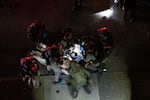
Paramedics attempt to treat Jay Danielson after he was shot during in downtown Portland, Ore., on Aug. 29.
Jonathan Levinson / OPB
When she asked if he could describe the shooter, he tried but couldn’t remember.
“Pappas was still very emotional,” Flohr recalled in her report, “taking minutes to bow his head and rock back and forth, and holding onto my wrist like a lifeline.”
Police later stripped Danielson’s corpse of his fully loaded Glock 17 and those three extra magazines. His pockets held a pack of Spry bubble gum, a flattened can of Truly hard seltzer and a wallet into which he had tucked his concealed-carry permit.
Later that night, a crowd of black-clad protesters gathered a block down the street from where Danielson died.
“Our community can hold its own without the police,” a woman said over a bullhorn. “I am not sad that a fucking fascist died tonight!”
The crowd cheered.
A time for alarm
Five nights later, four deputy U.S. Marshals in a pair of unmarked SUVs swept into a working-class neighborhood outside Olympia, Washington, and converged on a Volkswagen station wagon parked outside a townhome complex, pinning it to the curb.
Deputies dressed in khaki pants and armed with assault rifles immediately opened fire on Reinoehl, who fled his vehicle and took cover behind a pickup truck. According to the official account, they shouted “Stop! Police!” but multiple eyewitnesses said they heard no warning before the shooting began. The deputies' later gave conflicting accounts to investigators about what prompted the barrage; one said that Reinoehl pointed a .380-caliber pistol at them, another remembered Reinoehl’s hand being on the weapon. Investigators found the gun in his pocket.
The outcome is undisputed: Less than a minute into the encounter, Reinoehl lay dying on the pavement.
A few days later, Trump told Fox News that Reinoehl was a violent criminal and that the U.S. Marshals had rightly dispatched the killer of Danielson, with whom the president clearly sided.
“There has to be retribution,” Trump said, “when you have a crime like this.”
Finding common ground seems impossible right now: At a memorial in a suburban Portland bar, Danielson’s friends cursed antifa. Danielson’s former girlfriend, Christine Banks, remembered one man growing especially heated. As friends consoled him, another man spoke up.
“I’m antifa,” he said, and explained that he was there to pay respects to Danielson because, politics aside, they were drinking buddies. He was asked to leave — politely, Banks said — and did.
Nearly two months later, the media has moved on from both men and their encounter on a downtown Portland street. It’s easy to dismiss both as isolated cases — two average guys who became radicalized and died because of their extremist beliefs and their willingness to arm themselves in defense of those dueling ideologies.
But this is precisely the situation that scares law enforcement officials and elected leaders as the United States enters the last days of this historic and historically tense election.
What’s startling about the confrontation between Danielson and Reinoehl isn’t that it happened — but that more people were not hurt in those violent moments and that cities such as Portland, Kenosha, Wisconsin and Philadelphia haven’t seen more deaths. Activists on both the far right and the far left have been taking to the streets each night for months, emotionally — and increasingly, literally — armed for battle. In the coming days, no matter who is elected president, thousands of frustrated Americans likely will join them. Tempers are already high after months of demonstrations and political campaigning. The uncertainty and controversy expected to surround Tuesday night’s results will add another dangerous element.
The Anti-Defamation League has spent much of the last century thwarting anti-Semitism and exposing terrorists, hate crimes and threats to democracy. The ADL has taken a particular interest in studying combatants on the far left and far right as they clash in America’s streets. The slayings of Danielson and Reinoehl, in the space of just five days, only served to prove to both sides that they were right all along.
“The far right felt that they had been correct all this time by saying the left were terrorists and murderers,” said Vegas Tenold, one of the ADL’s investigative researchers and author of the 2018 book, “Everything You Love Will Burn: Inside the Rebirth of White Nationalism in America.” “The left,” he said, “felt they were being proven right — that the state would just sort of extrajudiciously kill people.”
Experts say there’s danger in that kind of certainty, and additional danger when the president of the United States and far-left groups come to agree on that narrative. ADL’s leadership, Tenold said, has discouraged its staff from calling America’s current clashes the opening volleys of broader conflict, the civil war both Danielson and Reinoehl feared.
Yet as Tenold points out, violence between these combatants is now so routine that the shooting and deaths are becoming an indistinct, but disturbing, backdrop for ordinary politics.
“We’ve been told very specifically not to say that the civil war is coming,” Tenold said. “Because you don’t want to be alarmist. But at what point does being alarmist just become the default? This should be a time to be alarmed. Yeah, there may not be a civil war, but I don’t see any reason why there won’t be much more violence.”
On Friday evening, 1,000 people gathered in Vancouver, a suburb of Portland just over the border in Washington, for a candlelight vigil to remember Kevin Peterson Jr., a 21-year-old Black man killed the previous night by sheriff’s deputies in a nearby town. (Authorities said they shot Peterson after he pulled a gun, but details remain foggy.) As the vigil began, about 100 far-right counterprotesters gathered on the fringes. They waved U.S. flags but also banners touting Trump’s reelection campaign and “thin blue line” flags — American flags that replace red, white and blue with blue, black and white to express support for police.
Pappas, the friend who was at Danielson’s side when he died, marched with them, wearing a baseball cap that said “Justice for Jay.” He carried what is known as a “ghost gun,” an assault rifle based on the AR-15 that can be bought without a background check and assembled from parts available on the internet. In a brief interview, Pappas said he intended to stop antifa from “invading” Vancouver and turning that city into Portland, not to crash the vigil for a dead man.
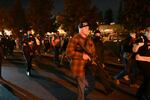
Chandler Pappas and right wing demonstrators walk near a vigil on Oct. 30 for a Black man killed by police in suburban Vancouver, Wash.
Justin Yau
At one point in the evening, separated from his group and followed on foot by a group of antifa activists, he made a point of racking a round into the chamber of his weapon as he strode down the middle of the street.
“I wanted to make a little bit of noise,” Pappas said, “let 'em know I wasn’t trying to kill today.”
OPB’s Sergio Olmos contributed to this story.



